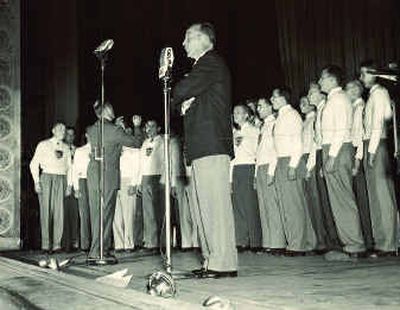Gonzaga’s Glee generation

Yes, there was a Gonzaga University in the national consciousness before GU became a basketball power. The school’s powerhouse in the 1930s, ‘40s and ‘50s was the Gonzaga University Men’s Glee Club.
Lyle Moore, the Glee Club’s founder and its only director, observed his 100th birthday on Wednesday. Celebrating with him on Sunday will be former members of the Glee Club along with their spouses and friends.
The alumni will honor Moore in festivities that begin with a sung Mass at the University Chapel followed by a reunion brunch, a Glee Club golf tournament, introduction of recipients of the Lyle Moore Scholarship, and much reminiscing.
Moore came to Spokane in 1928 to teach music at Whitworth College, but began teaching at Gonzaga in 1929. Following a year in New York to get a master’s degree at Columbia University, he returned to Spokane, started the glee club and led it to national recognition until it was discontinued in 1958. He took time out during World War II to fly transport planes in the South Pacific.
Having grown up on a farm in Illinois, Moore attended Eureka College (later to become famous as Ronald Reagan’s alma mater).
“He studied with some of the best voice teachers of time,” says former glee club member Paul McNabb, “and Lyle formed friendships and acquaintances with the big names in choral music like Fred Waring and Robert Shaw. Waring’s arranger would even send Lyle new arrangements to try out.
“But he always attributed his sense of discipline and capacity for hard work to his days as a farm boy,” McNabb adds.
Moore’s friendship with Waring, the leader of the top choirs on radio, was cemented in 1952 when Gonzaga won first place in a national college glee club competition sponsored by Waring.
The Glee Club toured extensively, performing more than 30 concerts during a spring break tour in 1949. The group sang to full houses at the Fox and Post Street theaters in Spokane and performed with another Gonzaga alum, Bing Crosby, both on tour and on radio.
Glee Club members have included several men who went on to musical careers as singers and choral conductors, such as Tom Skeffington, Anthony Pinski and the Rev. Larry Gooley, as well as Mike Kobluk and Chad Mitchell of the Chad Mitchell Trio.
“But most members of the Glee Club were not even music majors,” McNabb says, “but guys who became lawyers and doctors and businessmen such as Phil Thompson, Martin Weber, Lou Barbieri and Byron Swanson.”
McNabb, a former city editor of The Spokesman-Review, has written a history of the club in honor of Moore’s 100th birthday.
“A number of us have been getting together for the past several years in September,” McNabb says. “And a few years back some of the guys suggested that we start an endowed scholarship in honor of Lyle. We’ve done pretty well with that.”
“Pretty well” may be putting a bit mildly. The goal this year was to raise the endowment to $500,000.
“I think they’re optimistic about getting to goal,” McNabb says. “They’ll announce the actual figure at the brunch this weekend.”
Since the fund’s inception in 1998, more than $60,000 has been award to Gonzaga students based on criteria Moore devised, including character and community service along with musical and academic achievement.
Moore, who lives in Spokane with his wife Cherie (the former Eleanor Williams), still has the choral director’s way of cracking the baton.
Says Pat Reese, Gonzaga’s director of major gifts: “Lyle called a week or so ago and told me, ‘Tell those guys to start working out their voices starting out with 10 minutes a day. We can’t sing if everybody is out of shape.’ “
McNabb says that Moore always expected, and got, a lot from his Glee Club members.
“Each year he would choose anywhere between 30 to 40 (singers),” McNabb says. “They had to be ready to work; not every guy who had a good voice could get in. Character and commitment were a big part of it.”
McNabb remembers daily rehearsals, sometimes followed by sectional practices with even more rehearsing on weekend.
“One year I started counting the hours I spent in rehearsal,” McNabb says, “and in one seven-month period it amounted to something over 200 hours.”
“I asked a lot of the guys just what being in Moore’s Glee Club gave them,” he adds. “A surprising number of them cited two things: excellence and discipline.
“One said, ‘Lyle was like my dad, who told me, “Even if you’re a ditch digger, make sure your ditches are the best ones anybody’s ever dug.” ‘ Lyle has the same attitude.”